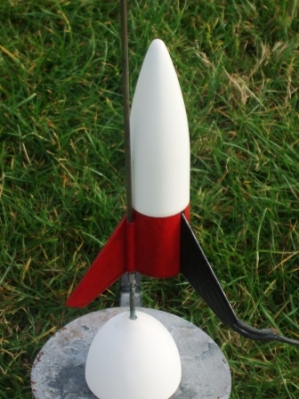
Brief:
A squat three finned 18mm motor rocket, from a relatively new rocket company called Odd’l Rockets. Recovers via a streamer.
Construction:
Kit consists of:
- Plastic nose cone,
- Body tube, 1 ¾ inch,
- Engine mount tube, 4 ¼ inch,
- Centering rings, (2),
- Engine block,
- Engine hook,
- Laser cut balsa fins,
- Launch lug, 1/8 inch by 1.5 inch,
- Kevlar, 17 inch,
- 1 foot length elastic shock cord,
- Shock cord lug,
- Clay weight, (11g)
- Mylar streamer, 1 foot
- Instruction booklet
- Parts list sheet.
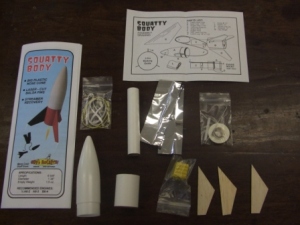
To build the kit I used
- CA gel glue
- White PVA glue
- Model knife
- Aluminium oxide sand paper
- Sanding sealer
- Enamel paint
I was lucky enough to be sent this rocket to review by Chris Michielssen from Odd’l Rockets. Squatty Body is, as the name suggests, a stubby rocket, quite small at only 1.38 inches wide and 6.63 inches tall. Flies on an 18mm motor. The majority of the rocket is the nose cone, making this rocket a bit unusual and a change from the usual small rockets that you send up on an A and never see again.
The quality of the parts in the kit is very good. The balsa fins are laser cut and the balsa is close grain required next to no filling. The shock cord is a mixture of quite thick Kevlar cord and elastic cord, and is ample in length. The nose cone is opened bottomed, which it needs to be for the design of the rocket. My nose cone had a bit of flash on it, but this easily sanded off and was no different from the quality I have seen from other manufacturers.
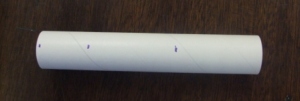

What really makes the kit good is the quality of the instructions; these were the best instruction that I have ever seen out of the hundred or so kits that I have built. Every step is clearly explained, with detailed diagrams so there is not chance of making a mistake. Building techniques are built in and explained, such as “double glue” method, as well as finishing techniques, such as getting the consistency right for the filler, and how to spray a rocket.
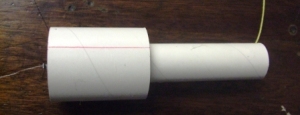
The general feel for the kit is that its been designed and made by someone who actually wants to create a good rocket and cares about the product more than the profit margin.
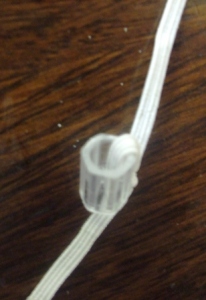
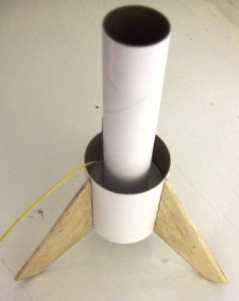
I built my rocket over the two days. There are no gotchas, and the rocket is an easy build. I built it stock, to the instructions with the exception of adding a disk of aluminium tape to the base of the nose cone mass instead of using glue to cover the clay. I’d give it a skill level of 1.5, certainly within the capabilities of someone new to the hobby.
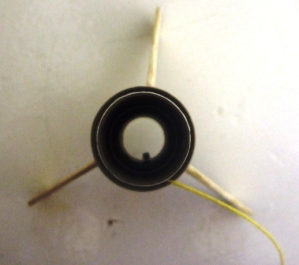
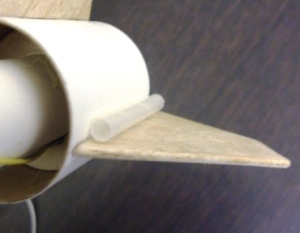
Finishing:
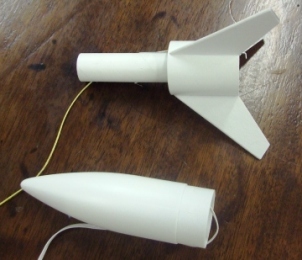 After sealing with sanding sealer, sanding, resealing, etc the entire rocket was primer with white primer.
After sealing with sanding sealer, sanding, resealing, etc the entire rocket was primer with white primer.
I went for a finish that was close to the artwork on the instructions. The nose cone was given two coats of gloss white enamel spray paint.
The body was given two coats of red gloss.
One fin was masked off with tape and then painted black.
The rocket then had two coats of finish added and buffed up.
No decals are provided with the rocket, but given the small size of the body, there would be little space for one.
Construction Rating: 5 out of 5
Flight:
Flies on a 1/2A6-2, A8-3 or B6-4 motor.
The instructions are detailed on how to prep the rocket for flight.
The Mylar streamer is folded as opposed to wrapped around the extended motor mount tube. No wadding is needed as the ejection charge blows the nose cone off.
The instructions call for the streamer to be added one third of the way down the shock cord so the body hangs below the nosecone.
First flight, 22nd November A8-3.
The squatty body lifts very quickly on a full A. Despite the winds, she flew straight, and ejected the streamer just after apogee. The streamer does not do much to slow the decent, but does help spotting the rocket in the air.
No damage on recovery.
Second flight, 22nd November A8-3.
Exactly the same as the first flight.
Third flight, 22nd November Quest B6-4. 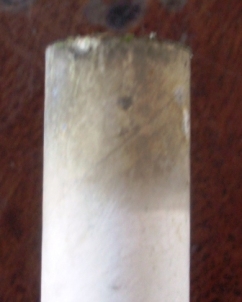
On a B, the rocket leaves the pad in a blink. Gaining enough altitude to make it hard to see, but still trackable. Ejection at apogee. Recovery is fast, but again close to the pad. Some slight charring to the mylar streamer was found, probably caused as the streamer deploys/opens as it passes the top of the extended motor mount tube. The Quest motor seems to kick out far more black soot than the estes motors, and this caused a most of the blackening that the top of the motor tube recieved.
Fourth flight, 22nd November Estes B6-4.
The estes motor was a bit slower than the Quest, but the flight was very similar. This time the mylar streamer is more charred.
Fifth flight, 22nd November Estes B6-4.
This time the streamer was removed, and break apart recovery used.
Flight was good with ejection at apogee. Recovery was faster, but this is a tough little rocket. The top of the motor mount is getting covered with ejection charge muck. The shock cord is showing some charring.
Sixth flight, 22nd November Estes C6-7. 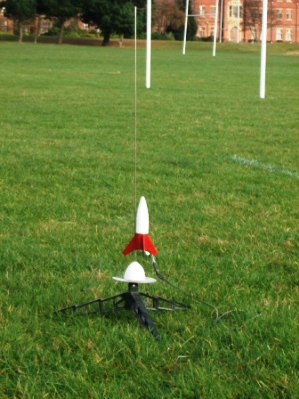
This is not a recommended motor, but for completion I thought I’d give it a go.
The rocket leaves the pad quickly and just keeps on climbing until it disappears, I was able to track it for a while with the delay smoke. I spent half an hour wandering around in the scrub and the neighbouring golf course but to no joy. Packing up, I headed back to my lab, luckily 500 meters from the pad on the way back I found the rocket. There is now more charring to the shock cord.
Given the C6-7 flight, I decided not to use the Aerotech D13!
The streamer is optional, the rocket recovers without damage on without one, but the streamer does aid tracking
Recovery:
A big little rocket that performs well allowing you to see the whole flight, unlike other faf (fire and forget) rockets that I have lost.
Flight Rating: 4 out of 5
Summary:
Pro’s
- The design is wind proof, and does not weathercock even in strong winds
- Great looking small field flyer.
Con’s
- After several flights, the elastic shock cord may need replacing, but this will be after a dozen or so flights and could easily be avoided by adding half a sheet of wadding
Overall Rating: 5 out of 5










 After sealing with sanding sealer, sanding, resealing, etc the entire rocket was primer with white primer.
After sealing with sanding sealer, sanding, resealing, etc the entire rocket was primer with white primer.







J.C.B. (December 12, 2009)